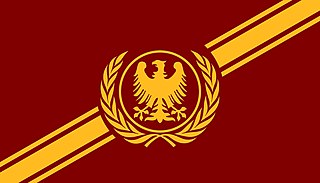In any conflict, especially in one so massive, there are reasons, actions and consequences. We know why the powerful Roman leaders did it and why the populace approved of it. But what did exactly the Romans do? Systematic Inhuman elimination had six theaters of action, and on only one of them the Italians have failed. Let's review them:
В любом конфликте, особенно в таком крупном как этот, есть причины, действия и последствия. Мы знаем почему могущественные римские лидеры хотели этого геноцида и почему плебеи поддерживали его. Но что конкретно-то сделали римляне? Систематическое уничтожение нелюдей происходило на шести театрах, и лишь на одном Рим ожидала неудача.
Tritonians of Carthage
Тритонианцы Карфагена
We already know about the Punic wars. There is a
fuller account of the event in our Chronicle, but suffice it to say that after this conflict, Carthage never really recovered. The city was burned to the ground. The fertile lands were spoiled by salt, which itself wasn't cheap, so here Romans also decided to show off their power and wealth. To top it off, sacks of enchanted poison were buried along the whole coastline in a project that took a year. The toxin was slowly seeping into water and made many Tritonians that attempted living in the nearby waters ill. Later, thanks to magic used during creation of such poison, it actually transformed into a lethal plague for the Tritonians wiping most of them off the face of the Earth.
Мы уже говорили о Пунических войнах. В нашей Хронике есть
более полная запись об этих событиях. Здесь же достаточно упомянуть судьбу Карфагена: город сожгли дотла, плодородные земли отравили солью, которая сама по себе не дешёвое удовольствие, так что римляне смогли ещё и своим богатством похвастаться. В дополнение ко всему римляне также закопали тысячи мешочков с зачарованным ядом по всему берегу вокруг Карфагена. Процесс занял целый год. Отрава понемногу проникала в океан, ослабляя живших неподалёку тритонов. Позднее из-за использованной при создании яда магии, он даже трансформировался в опаснейшую для тритонианцев хворь, которая практически стёрла их вид с лица земли.
Fauns of Hellenic World
Фавны Греческого мира
Some of Greek cities and Hellenic Empires made the mistake of supporting Carthage during the Punic Wars. It came back in a form of slow Roman expansion into Greece. The "silent invaders" used the divisions in Hellenic world to their benefit, and not until the entirety of Balkans and Asia Minor fell under their control, they didn't make a move against the primary Inhuman population of the area. But then... The forests Fauns loved so much were destroyed. The mines became mostly human-free, with Satyrs replacing workers. The glorious allies of Alexander were made into slave labor. In those mines Fauns were able to work twice as much as humans. In those mines they died, overworked, extracting what was to become armor and weapons for their masters' armies.
Некоторые греческие города и царства совершили ошибку: они поддержали Карфаген во время Пунических войн. За это им воздалось сполна: римляне начали медленно вторгаться в Грецию, поддерживая различные стороны в междуусобных конфликтах, пока, наконец, не завладели Балканами и Малой Азией полностью. До тех пор главное нелюдское население Греческого мира - сатиров - не трогали. Но потом... Великолепные леса, так обожаемые фавнами, были вырублены. Многочисленные рудники освободили от людей и заставили сатиров там работать: они могли делать вдвое больше. Величественные союзники самого Александра стали рабами, которые медленно погибали в этих шахтах, умирали от переработок, добывая железо, что использовалось в производстве брони и оружия для армий их новых хозяев.
Elves of Gallia
Эльфы Галлии
The geese saved Rome from the Gauls once. But nothing could save the Gauls and their signature Inhumans - the Elves - from Caesar. It would be amiss to mention that the famed Roman general and the destroyer of Republican ideals had no hatred towards the Inhumans, but he did use the public's animosity as a way to gain people's favor. Dividing and conquering across Gallia, starting with Helvetia and going northwards, he used every casus belli imaginable to gain more lands for Rome. Maybe some of you heard of the famed Roman "decimations" - mass executions of a tenth of the population in regions that showed resistance to Rome. Well, this tenth of populations were all elves. It brought some favor with some humans living in Gaul, made them care about their outlook in Roman eyes and immensely helped in the conquest. On the other hand, there were many Celts that revered their Elven minorities, and it resulted in Vercingetorix's Rebellion. Unfortunately for the forest-dwellers, it ended with the disastrous defeat at the battle of Alesia.
Гуси в своё время спасли Рим от галлов. А вот самих галлов и их нелюдей - эльфов - ничто не могло уже спасти от Цезаря. Нельзя не упомянуть, что непосредственно против нелюдей римский генерал и разрушитель республиканских идеалов ничего не имел, но злобу народную по отношению к ним использовал мастерски затем, чтобы получить поддержку населения Рима для будущих своих завоеваний. Завоёвывая Галлию по принципу "разделяй и властвуй", Цезарь продвигался по Галлии с южных земель гельветов на север, используя любой повод для войны, что попадётся под руку. Некоторые из вас знакомы с римскими "децимациями" - уничтожением одной десятой населения в местах, что посмели сопротивляться мощи Рима. Эти массовые казни были направлены исключительно против эльфов, что позволило завоевать доверие некоторых галлов. Они стали заботиться о том, как о них думают в Риме, и помогли Цезарю в его завоеваниях. Однако были и те галльские племена, что обожали и уважали своих эльфов, и именно они подняли восстание во главе с Венцингеториксом. К сожалению для жителей лесов, этот бунт закончился катастрофическим поражением под Алезией.
Serpentites and Thabenlings of Egypt
Египетские Серпентиты и Сабенлинги
Warriors and Pharaos in the past, Hellenic Egyptian citizens in the present, by the time the Romans came, the Serpentites were already dead, and Thabenlings - on the brink of extinction. From their perspective, about three centuries before Caesar ever set foot in Egypt chasing Pompey, a significant portion of them died in the battles against Alexander, many disappeared without a trace, and those who left had to contend with Humans ruling their country. They looked for many places where their talents could provide them at least a small part of power they used to enjoy when they ruled Egypt: piracy, mercenary work... These activities were high risk, high reward, and even though one Thabenling warrior is easily worth five humans, many still perished. By the time the Romans came, there were just hundreds of them. Caesar decided to let them die in peace, so did Mark Anthony. But when Octavian asserted his position as the Emperor, he gave an order to round the Thabenlings up and drown them in Nile.
Будучи воинами и фараонами в прошлом, и простыми гражданами элленистического Египта к моменту, когда туда прибыли римляне, сабенлинги уже испытывали проблемы с численностью, а их предки серпентиты и вовсе вымерли. Триста лет назад они понесли фатальные потери: многие воины погибли в боях с Александром, немало наследников Серпентитов просто исчезли, а те, что остались, должны были смириться со своей тривиальной ролью в новом Египте, управляемом людьми. Это было тяжёлой задачей. Чем они только ни занимались, чтобы вернуть хотя бы десятую часть той власти, что у них была во времена правления страной. Они становились пиратами, наёмниками... Это опасные занятия, и хоть одного воина сабенглинга обычно хватало на пятерых людей, их численность всё равно сократилась ещё сильнее. К приходу римлян представителей этого вида осталось буквально несколько сотен. Цезарь, понимая это, решил позволить им вымереть без какого-либо вмешательства. К тому же выводу пришёл и Марк Антоний. Но вот Октавиан Август был иного мнения. Когда он укрепил свои позиции, став Императором, от него пришёл приказ: собрать всех сабенлингов Египта и массово утопить их в Ниле.
Yah'Awi of Israel
Ияхави Израиля
Yah'Awi has managed to live over a century under Roman rule without being hunted or persecuted en masse. It was way easier for them to pass as Humans than for any other Inhumans. Roman leaders knew, of course, what they were, but the populace didn't. As long as they could pay taxes, help recruiting for the Roman army and avoid interfering with Roman religious traditions, the situation in Israel didn't stray too far from the standart "rebellion-response" dynamics. By the end of the I century AD Romans actually toned down the whole "elimination of the Inhumans" strategy and even started quetly enlisting them as mercenaries in some rare cases. But during the reign of emperor Hadrian, something must've happened with Roman gods that prompted him to restart Caesar's chase for the Elves in Britain. Romans always felt intimidated by monotheists as well, and since they couldn't fight Zoroastrians in Parthia, Hadrian, angered by another revolt, decided to turn to the "next best thing" and launched a massacre of Jews and, by extension, the Yah'Awi in Israel, killing about a million people as the result.
Ияхави умудрились прожить больше века под властью римлян без всяческих притеснений и массовых казней. Им намного проще было сходить за людей, что, конечно, от властей скрыть было невозможно, но люди могли и не знать. До тех пор, пока ияхави могли спокойно платить налоги, помогать с набором в римскую армию и не противоречить религиозным традициями империи, динамика отношений Рима с Израилем не выходила за рамки стандартного режима "восстание - подавление". К концу первого века нашей эры римляне даже немного поумерили пыл в планах по истреблению нелюдей, начали их в наёмнические бригады принимать. Однако что-то случилось с римскими богами при императоре Адриане. Доподлинно неизвестно что, но возобновилась охота на эльфов в Британии, начатая ещё Цезарем. Римские лидеры также до ужаса боялись монотеизма, а раз уж с зороастрийцами в Парфии разобраться не удавалось, они решили согласиться на "второй вариант" и, когда началось очередное восстание, обрушили свой гнев на Израиль. Адриан лично возглавил легионы и, по итогам этой кампании, почти миллион евреев и ияхави был истреблён.
Dragonkind of Germania
Дракониды Германии
The only fiasco of the Romans were the Germans. After the disastorous battle of Teutobourgh forest where
the dreaded wyrms burned the legions in their armor as if they were some kind of a cooked meal, nobody in the Empire ever tried going further into Germany. After the defeat there was a small purge: the Dragonkind - the Kobolds and the Draconids - serving in the Roman army were all eliminated. But the species lived on with their wise Dragon leaders in the Alps and other European mountains until the Huns came. These invaders from the East restarted an old Roman trend of trying to hunt dragons for valuable scales and other body parts. It was then adopted by the Christians trying to rid their lands of monsters. As the result, by the XIV century, dragons and their derivatives were considered extinct by the Church after years of knightly dragonhunts that also helped Vatican control the population of landless knights to some extent.
Лишь германцы смогли нанести римлянам поражение. В битве при Тевтобургском лесу
летучие змеи сожгли дотла легионеров, будто бы те были хорошо завёрнутой в металл пищей. После этого Империя больше не пыталась продвигаться вглубь Германии. Конечно, римляне устроили небольшую чистку уже в своих рядах, уничтожив служивших в их армии кобольдов и драконидов. Однако сам по себе вид продолжал своё существование в лесах Германии, во главе с могущественными драконами, жившими в Альпах и лесах Центральной Европы. Так оно всё и было спокойно до прибытия гуннов, которые вернули римскую моду на охоту на драконов ради чешуи и других ценных частей тела этих существ. Потом истребление продолжили уже христиане, пытаясь освободить свои земли от монстров. Ватикан также контролировал популяцию безземельных рыцарей, объявляя охоты на драконов. Закончилось всё тем, что к 14 веку нашей эры драконов и их производных просто-напросто не осталось.











An interesting way to weave history together with your setting, making it a believable tie-in. And I love how it acknowledges that the Romans were <censored> <censored> <lots of censored>. =)
Too low they build who build beneath the stars - Edward Young
xD. Well, the Fringe Society isn't known for subtlety in matters of history, as it might be apparent from this and other articles :) And yeah, you got it right, I'm trying the damnedest to weave fantasy into history using as much knowledge I have from my education and work in international relations as I can, which, I believe, helps me make it more organic. Thanks for your comment!